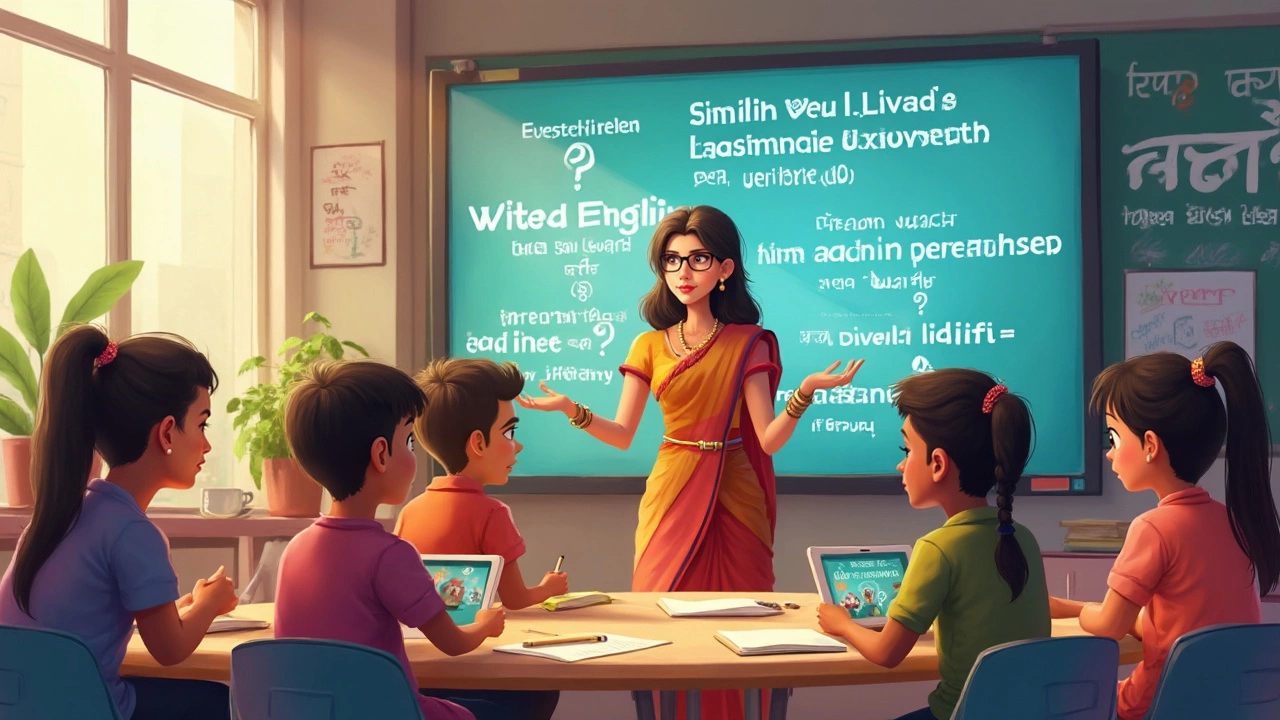What March 2025 Brought to Mapping Education in India
April may be on the horizon, but March left us with a lot to chew on. From shaking off the fear of speaking English to figuring out how long a coding bootcamp really lasts, the month’s articles were all about practical steps you can take right now. Below is a quick run‑through of the most helpful pieces, grouped by what you might be looking for today.
Boosting Language Skills
If you get a knot in your stomach every time you have to speak English, you’re not alone. Our post “Why Am I So Afraid to Speak in English?” broke down the anxiety into three easy‑to‑manage parts: fear of mistakes, fear of judgment, and lack of safe practice spaces. The takeaway? Start with low‑pressure chats – think ordering coffee or chatting with a friend in a language‑exchange app – and slowly raise the stakes.
For beginners, “How Beginners Can Start Speaking English Effectively” gave a step‑by‑step plan: set a tiny daily goal (like learning five new phrases), use phone recordings to catch pronunciation errors, and swap subtitles on your favorite shows. The result? You build confidence without feeling overwhelmed.
Two posts focused on fine‑tuning your speaking ability. “Improve Your English Speaking Skills Efficiently” highlighted the science behind spaced repetition and interactive speaking drills. Meanwhile, “Best Skill to Master for Excelling in English” reminded us that active listening beats endless grammar drills. By listening to podcasts, news clips, or even TikTok videos, you pick up rhythm, tone, and vocabulary that you can instantly mirror.
Choosing the Right Path: Coding, Exams & Careers
Thinking about a coding career but unsure how long you need to study? “How Long is Coding School? A Deep Dive Into the Duration of Learning Code” compared full‑time bootcamps (9‑12 weeks) with part‑time programs that stretch over several months. The key message: pick a schedule that fits your life, not the other way around.
Worried that weak math skills will hold you back? The article “Can You Learn Coding If You're Bad at Math?” cleared that up. Coding relies more on logical thinking and problem‑solving than on algebra, so you can start with visual programming tools and gradually move to text‑based languages.
For students gearing up for big exams, we covered both NEET and JEE. “Who Actually Teaches Best for NEET Success?” gave a checklist to spot a great NEET teacher – clear explanations, regular mock tests, and motivational support. On the JEE side, “Is Physics Wallah Effective for JEE?” broke down the platform’s strengths (short videos, practice questions) and its limits (less personalized feedback). Use those insights to decide if the platform matches your learning style.
Career‑oriented readers liked the deep‑dive into high‑pay vocational courses. “High‑Paying Vocational Courses: Your Path to Success” listed fields like health tech, data analytics, and renewable energy, explaining the average salary, required certification, and where to find apprenticeships. Pair that with the “Programming vs. Coding: What's the Difference?” guide if you want to understand whether to aim for a developer role (full programming) or a more focused coding job.
Lastly, the success stories of IIT alumni in the US reminded us that a solid engineering foundation can open doors worldwide. “Famous IITians Making Waves in the US” highlighted a few trailblazers in tech startups and academia, showing that the IIT brand still carries weight abroad.
All in all, March 2025 offered a toolbox for anyone wanting to improve language skills, jump into tech, ace competitive exams, or choose a lucrative career path. Pick the article that matches your current goal, try the quick tips, and keep moving forward.
Why Am I So Afraid to Speak in English?
Ever feel a knot in your stomach when it's time to speak English? You're not alone. Many people experience fear when speaking a foreign language, rooted in fear of making mistakes or being judged. However, there are practical ways to overcome this, like practicing in low-pressure environments and gradually increasing your exposure to English. Becoming fluent doesn't happen overnight, but with consistent effort, anyone can gain confidence.
How Long is Coding School? A Deep Dive Into the Duration of Learning Code
Coding school durations vary significantly depending on factors like program intensity and student goals. Full-time bootcamps can last from 9 to 12 weeks, while part-time options stretch over several months. Knowing the time commitment required can help you choose the right course. Coding isn’t just about timelines; it’s about building a solid foundation for a tech career. This article provides tips to help navigate the timing and intensity of learning to code.
How Beginners Can Start Speaking English Effectively
Starting to speak English can be a daunting task for beginners, but with the right strategies, it becomes manageable and even fun. This article provides practical tips and insights for beginners on how to embark on their journey of speaking English. From understanding the basics to immersing themselves in the language, learners will find valuable guidance. Discover how to set realistic goals, use technology to your advantage, and keep motivated along the way to becoming proficient in English.
Who Actually Teaches Best for NEET Success?
Finding the best teacher for NEET preparation can make a huge difference in a student's performance. The right teacher provides more than just knowledge—offering guidance, strategies, and motivation. This article explores where to find such teachers, how to recognize them, and the unique qualities that set them apart. Understanding these factors helps students and parents make better choices for exam success.
Famous IITians Making Waves in the US
Explore how IIT alumni have made a name for themselves in the United States, achieving remarkable success across various fields. Discover influential figures who began their journey at IIT and are now leaders in technology, academia, and entrepreneurship. Learn about their contributions to innovation and how they are shaping industries worldwide. Gain insights into how aspiring IITians can follow in their footsteps. Uncover the impact of IIT education on these trailblazers' careers.
Is Physics Wallah Effective for JEE?
Is Physics Wallah really up to the mark when it comes to JEE preparation? This article digs into the methods and effectiveness of Physics Wallah for those gearing up for IIT entrance exams. With factual insights and practical tips, you’ll discover whether this online platform fits your preparation needs or not. Explore the key features that set Physics Wallah apart and how to make the most of their resources. Get ready to unravel if this is the right step towards your IIT dream.
Can You Learn Coding If You're Bad at Math?
Wondering if your lack of math skills might hold you back from learning to code? Dive into this article to uncover the truth about coding and math. Spoiler: being bad at math doesn't mean you can't become a proficient coder. While math can definitely help, coding is more about logic and creativity. We explore practical tips for those hesitant about math but passionate about coding.
Improve Your English Speaking Skills Efficiently
Struggling to improve your English speaking skills? Discover practical tips and surprising facts to make your journey smoother. From interactive courses to the science behind language acquisition, this article offers a comprehensive guide. Whether you're a beginner or just looking to polish your skills, find out how to practice effectively and engage with the language daily. Dive into strategies that make learning fun and rewarding.
High-Paying Vocational Courses: Your Path to Success
Choosing a vocational course can lead to a rewarding career with high salary prospects. In this article, we explore vocational courses that offer the highest salaries, provide practical tips for making informed decisions, and discuss real-world situations where these skills are in demand. From healthcare to technology, find out which paths can offer great financial benefits.
Programming vs. Coding: What's the Difference?
Understanding the difference between programming and coding is essential for anyone entering the tech world. While coding involves writing the specific instructions computers need to perform tasks, programming encompasses the entire process of creating software, including planning, designing, testing, and more. Distinguishing these terms helps beginners choose learning paths that align with their goals. Here's a closer look at what sets them apart and how each plays a role in the tech landscape today.
Best Skill to Master for Excelling in English
Learning English effectively comes down to mastering the skill of active listening, as it enhances comprehension and speaking abilities. This underrated skill immerses learners in the intricacies of spoken language, enabling them to understand context, tone, and vocabulary better. Integrating active listening with practical exercises significantly boosts linguistic proficiency. This article explores why active listening is crucial and offers tips to develop this skill for better English mastery.
How Rare Is an MBA in Today’s World?
The article delves into the rarity of MBAs in the modern educational landscape, exploring how common this degree truly is. We'll look at global statistics, highlight the uniqueness of specialized MBA programs, and examine the career impact of having such a qualification. The piece aims to offer insightful information for those considering this career path, combining facts with practical tips on whether pursuing an MBA is the right choice.











